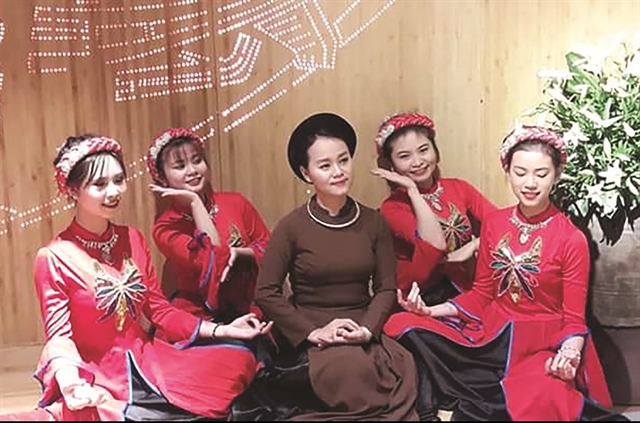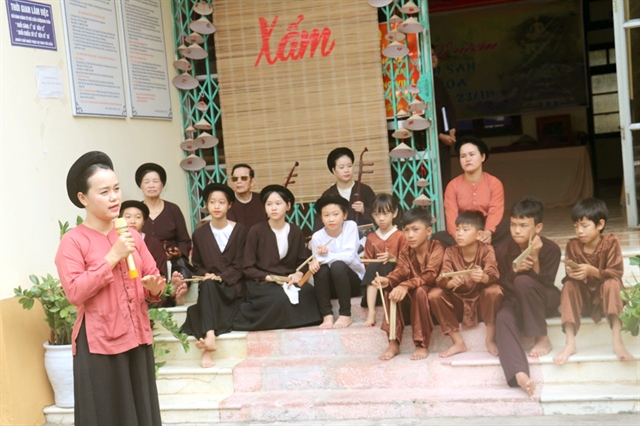Weather:
- Ha Noi 23oC
- Da Nang 26oC
- Ho Chi Minh 27oC

Nguyễn Thu Phương, 36, was born and grew up in Quảng Ninh Province, home to many of Việt Nam's singers in genres such as pop, rock, hip-hop and R&B. However, she chose to specialise in folk music. After years of studying hát xẩm (blind busker's singing), Phương now has a leading role in this music in the country. She even holds free xẩm singing classes to revive and develop the folk genre. Phương spoke with Thanh Hà about her plans.
Inner Sanctum: Singing and teaching are two totally different jobs. How have you prepared for teaching?
Previously, I gave my experience and advice. But to give lectures, I have spent several years strengthening my background and reading books to upgrade my knowledge so that I can work out a suitable programme which helps my students approach hát xẩm more easily. I need to have pedagogical skills, applying my lecturers' ways of giving out information and communicating.
My teaching project began one and a half year ago. The first course had 12 high-school students, learning twice a week in Quảng Ninh. Meanwhile in Nam Định Province, I plan to organise a class for secondary students but because of the pandemic I haven't carried it out yet.
Recently, I organised online classes for overseas Vietnamese communities in the US, Germany, France and Poland. I received great feedback from them, which was a motivation for me to continue.
It is more difficult to teach that way but I hope to have around 1,000 people from these communities, which will help spread the folk genre to other Vietnamese in the world.
Inner Sanctum: People, especially the young, are strongly influenced by modern performing arts. What gives you confidence in your choice?
Preserving and bringing traditional art into play must be done by young people. They are full of energy, learn fast and work passionately. These are necessary qualities to maintain traditional cultural values.
Frankly, traditional arts have been ignored in more than one generation. Many parents who were born in the 1990s have no idea of lullabies.
Instead of becoming full of regret, we should do something right now.

Inner Sanctum: How do you interact with the young, especially when there is an age gap?
I have co-worked with a school to teach xẩm singing to elementary students. There are some special naughty kids in that school but they turn into nice students when they learn to sing folk music and they cooperate really well.
I believe that learning must be fun and interesting first, and then they can receive and understand lessons. I create the best conditions for them to play with and research the instruments.
Blind busker's songs for children are often about cute topics and themes which are close and familiar with childhood. I try to connect them with their memories and experiences, and then we sing together.
With older learners, I tell them about history of the folk music genre and how to practise singing skills.
Working with them is more comfortable and easier as they are a little bit more mature and their understanding is much better.
They learn the beats, the rhythms and different melodies. I tell them how to articulate with every word, and tell them how to manage their breath, vibration and resonance while singing.
The most difficult thing in the blind busker's singing is how to sing simply but technically to show all the beauty of the lyrics and melody to audiences.
Inner Sanctum: What are the main challenges you meet?
When I started my project, I received support from a company who bought instruments, such as castanets, drums, đàn bầu (one-string zither), đàn nhị (two-chord fiddle) and a hi-fi system to serve our teaching and learning activities.
I worked with the Nhất Phương Enterprise in Nam Định to publicise the traditional copper cast craft. They pledge to help me in recording my lectures and my songs. The 3S Company built me a website where I can post all the information on the art of xẩm singing such as the songs, lyrics and pictures. However, I still have to sing at events to make money for my daily life.
I am looking for a two-chord fiddle artist. I know one and am pushing him to work with me. To go a long way, I need and hope to find great partners. We are all trying to preserve this folk art.

Inner Sanctum: Do you think about how to publicise xẩm singing to larger audiences?
When Việt Nam takes part in international culture exchanges, traditional artists are always part of the delegation. However, at home there isn’t a proper policy or plan to develop it. I think we should solve this first.
Personally, I have had my way to kick it up. In the past when there was no coronavirus, I went to big festivals in Bái Đính Pagoda and Hương Pagoda to sing. Audiences gradually became familiar with and loved the music.
I think we should bring xẩm singing to larger spaces and markets to make sure it can spread more widely.
Music apps have played a big role in pushing music across borders. YouTube, Facebook, Zalo and Bigo are also great social networks to publicise xẩm singing.
I hope (in the future) to have an international competition or a connection to develop traditional and folk arts such as through Facebook as there are many young people using it.
Inner Sanctum: Putting all your life and money into xẩm singing has been tough and forced you to have a difficult life. Have you ever regretted it?
Over more than a decade singing xẩm, I found it my real passion and want to stick with it. Of course, I have met many challenges and difficulties, and lack of taking care of my family is the biggest worry.
In the last two years, the pandemic has created more problems for people. Artists, especially those who work freelance like me, suffered a lot because we live off doing events.
But I have never thought of giving up. I always think positive, sharpen my technique and try to find a way to overcome any challenges.
Many people at my age are living in a comfortable condition, but my biggest treasure is love from the audience.
A Vietnamese saying goes "A useful trade is a mine of gold." I ask myself if I have made my own trademark in my career, and the answer is that I need to work harder and one day all good things will come.
The definition of prosperity depends on people's point of view. I just want to do what I like and I live a healthy and happy life. That is enough. VNS


